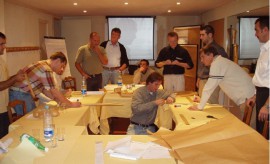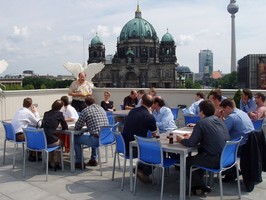Background
Within the context of teams there often exists unexploited potential for the simultaneous improvement of performance (effectiveness) and the quality of work life. Teams are confronted with extremely high expectations on results.
Members of international teams are confronted with the additional challenge of constructively handling culturally determined differences in behaviour and perceptions:
- What is the primary task of the team?
- What are the goals of the new partners and the team members from other origins?
- What are the underlying expectations of the others?
- What is their way of exercising leadership?
- How can we fulfil the task assigned?
- What is an acceptable balance between taking and giving for me?
- What are the new rules and what possibilities do I have to influence them?
- What is the most appropriate organisational form and how is it possible to reach it as soon as possible?
Aim
The aim of the team coaching is to create opportunities for members in international teams to improve communication and co-operation skills and to develop optimal forms of decision making, leadership, integration and innovation.
The guiding principle in facilitating international teams is to support their members in identifying and understanding differences and utilising these differences as a constructive force for achieving better team results.
The approach and the inputs of the coaches are all designed to provide orientation and better self-management in roles.
Team members are enabled to
- develop a shared vision of the primary task
- set and meet mutual expectations and contributions to success
- develop an appreciation of cultural standards that enables them to:
- correctly interpret and anticipate the approaches of each cooperation partner
- successfully pursue their own objectives
- recognise areas of intercultural conflict and constructively handle them
- negotiate and agree upon roles and objectives
- accept different forms of motivation and commitment
- develop rules of communication, co-operation, transparency, openness, leadership, planning, conflict management
- identify success factors governing the team performance
- develop practical proposals and the next steps of the team development
- better define the advantages of working together and establish team loyalty
- install the team as a part of a learning organisation
- know each other better, establish personal relationships and enjoy the time spent with colleagues.
Emphasis
Improvement of team effectiveness can only be achieved by identifying and addressing the relevant issues which are impacting the team's work and performance: centre around intercultural, if intercultural interaction is an issue; leadership, if leadership is a key constraint of the team, conflict resolution...., etc.
Methods
We focus primarily on individual and group experience and expectations. Practical alternatives based upon coaches’ experience with similar situations may be useful. We work mostly with organisational constellations, the Riemann-cross and cooperation-matrixes.
Team Building Steps
Step 1:
Discussions between the team leader (plus eventually his superior) and the consultants followed by a contract on the objectives, the approach and the process.
Step 2:
Interviews by the consultants of the team members (optional)
Step 3:
Exploitation of the interviews by the consultants and fine tuning of the workshop task, themes and methodology. What are the issues that can be treated in a workshop? What are the issues to be
treated in another setting? (optional)
Step 4:
Preparation of the workshop with the team leader including definition of the roles of the consultants and the team leader during the workshop.
Step 5:
Workshop for the team members.
Step 6:
Balance of the workshop results and prospects by the team leader (plus eventually his superior) and the consultants. What has been solved and what are the remaining issues to be treated by whom in which setting?
Step 7:
Follow-up steps: balance of the team development since the workshop, preparation of the next steps with the team leader.
Step 8,9,…:
Follow-up-Meetings with the team members….
Clients of Holzhauser & Partner in the field of team support (eg)
- Agrar- und Hydrotechnik International
- Airbus (Satellites; Defence; Elbe Flugzeugwerke; Helicopters)
- ALLEO (JV DB – SNCF)
- Bayern-Chemie / PROTAC
- Bertelsmann Arvato
- Caritas international
- CILSS
- CS Communication & Systèmes
- Daimler Commercial Vehicle Division
- EuroAirport Basel-Mulhouse-Freiburg
- FEPS, Foundation for European Progressive Studies
- Fraunhofer-Instituts
- Friedrich-Ebert-Stiftung
- Getinge / ALM / Maquet
- GTZ/GIZ Africa, Asia and Europe
- Junghans microtec (JV Diehl – Thales)
- Lafarge Gips
- MegaPart
- SaarForst Landesbetrieb
- Sirona Dental Systems
Team of coaches
Coaches from the company of Holzhauser & Partner and its network. We can rely on the co-operation and competence of senior consultants and coaches with whom we have built-up a tried and experienced relationship over many years.
Michael Holzhauser, Germany
Joint Owner and Managing Director of a Consulting firm with emphasis on organisational development in national context and of international co-operations, project management, leadership, coaching/role counselling and team development. Formerly: Director of international training and management development programs in Europe, eight years experience as an executive and as consultant in Africa, four years in Asia.
Omar Aktouf, Canada
Emeritus of the chair of management studies at the Ecole des Hautes Etudes Commerciales, Quebec. Consulting work with Canadian and French multinationals on international strategy, organisational diagnosis and auditing. Formerly 8-year Human Resources Director in Algerian industry.
Karin Beckert, Germany
Consultant in organisational development. In the last years focus on coaching of individuals and teams in Europe. Conflict mediation labour relations. Work-life-balance consultancy. Several years responsibilities in project management in Germany and West Africa. Certified systemic coach (ISB Wiesloch).
Ajit Bopitiya, Sri Lanka
Trainer and consultant for change management in Asia. Special fields: communication and developing of professional roles. Formerly manager in palm and printing industry in Sri Lanka.
Yan Dautzenberg, France
Founder and Managing Director of small Software-Companies in Paris Training in Mathematics (DEUG, Université Paris X), Journalism and Commerce. Currently running a series of international multi-media projects and consulting German-French business co-operations.
Barbara Hill, United Kingdom
Project Manager & Business Change Consultant. Owner of: nimbleChange. Prince 2 Certified, Mediator (UK) and Systemic Consultancy Practitioner. Previously an international manager for both the global pharmaceutical Roche and Bayer Groups.
Richard Hosking, United Kingdom
Organisational Consultant. Owner of consulting firm: Integrated Management. Graduate member of the Tavistock Institute International Advanced Organisational Consultation Society. Previously was a manager and internal consultant with the international chemical and pharmaceutical company, ICI.
Mee Rae Kim, Germany and Korea
Managing Partner of Asiaforum Kim & Kim GbR, core competencies: training and coaching for German and Korean managers and technical staff. Consultant for German-Korean joint-ventures.
Burkard Sievers, Germany
Professor emeritus for organisational development at the Schumpeter School of Business and Economics, University of Wuppertal. He developed and directed post-graduate training programmes for management executives from economic and social sectors with emphasis on role counselling and organisational development.
Holzhauser & Partner is a member of BVMW, The German Association for Small and Medium-sized Business







